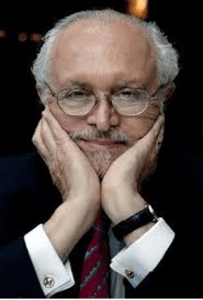Remembering Mario Molina: The brilliant scientist and advocate who sounded the alarm on the Ozone Layer Depletion

The passing of Dr Mario Molina on October 7, 2020 is a deep loss, not only for the scientific community, but also for many who worked alongside him in fighting to solve the greatest threat to our world – climate change. However, his legacy is clear and resounding. In his latest work[1], he told us that there is an unprecedented need for speed to slow down climate changes and avoid catastrophic events and irreversible damage to our planet.
His most notable work, for which he was recognised in 1995 by co-winning the Nobel Prize in Chemistry, helped predict in the mid-1970s that global emissions of chlorofluorocarbons (CFCs) could deplete stratospheric ozone. A decade later, scientists at the British Antarctic Survey reported that a vast hole had appeared in the ozone layer over the South Pole.
CIFF’s CEO, Kate Hampton, reflected on Dr Molina’s impact:“The ozone issue got me into campaigning at the age of 12, but I only had the pleasure of meeting Mario decades later. He has inspired three generations of environmentalists and scientists around the world and will be missed. CIFF will honour his memory through our continuing commitment to implementation of the Kigali Amendment and our support for Mexican NGOs.”
Dr Molina was well known for his tireless advocacy and scientific diplomacy and which played a key role bringing about the 1987 Montreal Protocol, one of the most successful international agreements of all time. The agreement brought together 197 countries to phase out CFCs and ozone-depleting chemicals and was the first United Nations treaty to achieve universal ratification allowing the recovery of the ozone hole.
But his work did not stop there. He was one of the key individuals to recognised the next threat to our atmosphere – climate change. In 2009, he co-authored a paper titled ‘Reducing abrupt climate risk using the Montreal Protocol and other regulatory actions to complement cuts in CO2 emissions’. His paper shows us a clear roadmap for fast mitigation of substances that deplete the ozone and other super-greenhouse gases.
More recently, Dr Molina worked relentlessly on advocacy and policies that became integral to the Kigali Amendment to the Montreal Protocol in 2016. This amendment was critical to ensuring the Montreal Protocol maintained its effectiveness, by phasing down the use hydrofluorocarbons (HFCs) that replaced the ozone-depleting CFC and HCFC, which contribute significantly to global warming.
The Kigali Amendment also recognised the importance of ensuring a transition to climate-friendly and energy-efficient cooling equipment. Dr Molina also co-chaired the steering committee on the UNEP and IEA Cooling Emissions and Policy Synthesis Report, which showed that the combined strategy to improve energy efficiency of cooling equipment while phasing down HFC refrigerants under the Kigali Amendment to the Montreal Protocol is one of the biggest climate change mitigation opportunities available today.
At CIFF, Dr Molina’s work has inspired us all so much so that since 2009, we have been working relentlessly with our partners to accelerate the phasing down of HFCs and increase the energy efficiency of cooling equipment to take this biggest mitigation opportunity forward.
Sonia Medina, Executive Director, Climate Change, CIFF: “Dr Molina was a pioneer not only in the field of chemistry, but a visionary as an environmental scientist. A passionate and relentless climate protector, who always showed such commitment to fighting climate change scepticism by bringing forward ground-breaking research. Here at CIFF, his work and memory will continue to inspire us and motivate us to push harder to help solve the greatest issue of our time.”
While Dr Mario Molina is no longer with us, his work and legacy will remain. He has left us with a clear roadmap of what to do, and a clear message – there is no time to lose.
[1] https://thebulletin.org/2020/04/best-path-to-net-zero-cut-short-lived-super-pollutants/